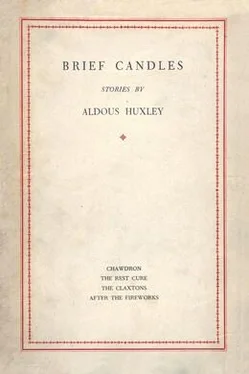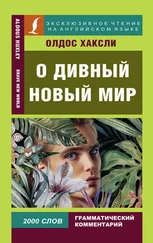Олдос Хаксли - Brief Candles. Four Stories
Здесь есть возможность читать онлайн «Олдос Хаксли - Brief Candles. Four Stories» весь текст электронной книги совершенно бесплатно (целиком полную версию без сокращений). В некоторых случаях можно слушать аудио, скачать через торрент в формате fb2 и присутствует краткое содержание. Год выпуска: 2017, Издательство: epubBooks Classics, Жанр: Классическая проза, на английском языке. Описание произведения, (предисловие) а так же отзывы посетителей доступны на портале библиотеки ЛибКат.
- Название:Brief Candles. Four Stories
- Автор:
- Издательство:epubBooks Classics
- Жанр:
- Год:2017
- ISBN:нет данных
- Рейтинг книги:4 / 5. Голосов: 1
-
Избранное:Добавить в избранное
- Отзывы:
-
Ваша оценка:
- 80
- 1
- 2
- 3
- 4
- 5
Brief Candles. Four Stories: краткое содержание, описание и аннотация
Предлагаем к чтению аннотацию, описание, краткое содержание или предисловие (зависит от того, что написал сам автор книги «Brief Candles. Four Stories»). Если вы не нашли необходимую информацию о книге — напишите в комментариях, мы постараемся отыскать её.
Brief Candles. Four Stories — читать онлайн бесплатно полную книгу (весь текст) целиком
Ниже представлен текст книги, разбитый по страницам. Система сохранения места последней прочитанной страницы, позволяет с удобством читать онлайн бесплатно книгу «Brief Candles. Four Stories», без необходимости каждый раз заново искать на чём Вы остановились. Поставьте закладку, и сможете в любой момент перейти на страницу, на которой закончили чтение.
Интервал:
Закладка:
‘I won’t look,’ he assured her. ‘And anyhow,’ he added, when they had taken two or three more steps across the room, ‘now I can’t.’ And he turned the switch.
The pale translucent red went black again before her eyes. Pamela sighed. ‘I’m so tired,’ she whispered. Her eyes were still shut; she was too tired to open them.
‘Take off your coat.’ A hand pulled at her sleeve. First one bare arm, then the other slipped out into the coolness.
Fanning threw the coat over a chair. Turning back, he could see her, by the tempered darkness that entered through the window, standing motionless before him, passive, wearily waiting, her face, her limp arms pale against the shadowy blackness.
‘Poor Pamela,’ she heard him say, and then suddenly light finger–tips were sliding in a moth–winged caress along her arm. ‘You’d better lie down and rest.’ The hand closed round her arm, she was pushed gently forward. That taxi, he was still thinking, the upstairs room … But his fingers preserved the silky memory of her skin, the flesh of her arm was warm and firm against his palm. In the darkness, the supernatural world was coming mysteriously, thrillingly into existence; he was once more standing upon its threshold.
‘There, sit down,’ came his voice. She obeyed; a low divan received her. ‘Lean back.’ She let herself fall on to pillows. Her feet were lifted on to the couch. She lay quite still. ‘As though I were dead,’ she thought, ‘as though I were dead.’ She was aware, through the darkness of her closed eyes, of his warm breathing presence, impending and very near. ‘As though I were dead,’ she inwardly repeated with a kind of pleasure. For the pain of her misery had ebbed away into the warm darkness, and to be tired, she found, to be utterly tired and to lie there utterly still were pleasures. ‘As though I were dead.’ And the light reiterated touch of his finger–tips along her arm—what were those caresses but another mode, a soothing and delicious mode, of gently dying?
In the morning, on his way to the kitchen to prepare their coffee, Fanning caught sight of his littered writing–table. He halted to collect the scattered sheets. Waiting for the water to boil, he read. ‘By the time you receive this letter, I shall be—no, not dead, Pamela … ’ He crumpled up each page as he had finished reading it and threw it into the dust–bin.
IX
The architectural background was like something out of Alma Tadema. But the figures that moved across the sunlit atrium, that lingered beneath the colonnades and in the coloured shadow of the awnings, the figures were Hogarthian and Rowlandsonian, were the ferocious satires of Daumier and Rouveyre. Huge jellied females overflowed the chairs on which they sat. Sagging and with the gait of gorged bears, old men went slowly shambling down the porticoes. Like princes preceded by their outriders, the rich fat burgesses strutted with dignity behind their bellies. There was hungry prowling of gaunt emaciated men and women, yellow–skinned and with tragical, bile–injected eyes. And, conspicuous by their trailing blackness, these bloated or cadaverous pencillings from an anti–clerical notebook were priests.
In the midst of so many monsters Pamela was a lovely miracle of health and beauty. These three months had subtly transformed her. The rather wavering and intermittent savoir–vivre , the child’s forced easiness of manner, had given place to a woman’s certainty, to that repose even in action, that decision even in repose, which are the ordinary fruits of the intimate knowledge, the physical understanding of love.
‘For it isn’t only murder that will out,’ as Fanning had remarked some few days after the evening of the fireworks. ‘It isn’t only murder. If you could see yourself, my child! It’s almost indecent. Anyone could tell that you’d been in bed with your lover. Could tell in the dark, even; you’re luminous, positively luminous. All shining and smooth and pearly with love–making. It’s really an embarrassment to walk about with you. I’ve a good mind to make you wear a veil.’
She had laughed, delightedly. ‘But I don’t mind them seeing. I want them to see. I mean, why should one be ashamed of being happy?’
That had been three months since. At present she had no happiness to be ashamed of. It was by no shining of eyes, no luminous soft pearliness of smoothed and rounded contour that she now betrayed herself. All that her manner, her pose, her gestures proclaimed was the fact that there had been such shinings and pearly smoothings, once. As for the present, her shut and sullen face announced only that she was discontented with it and with the man who, sitting beside her, was the symbol and the embodiment of that unsatisfactory present. A rather sickly embodiment at the moment, a thin and jaundiced symbol. For Fanning was hollow–cheeked, his eyes darkly ringed, his skin pale and sallow under the yellowed tan. He was on his way to becoming one of those pump–room monsters at whom they were now looking, almost incredulously. For, ‘Incredible!’ was Fanning’s comment. ‘Didn’t I tell you that they simply weren’t to be believed?’
Pamela shrugged her shoulders, almost imperceptibly, and did not answer. She did not feel like answering, she wanted to be uninterested, sullen, bored.
‘How right old Butler was!’ he went on, rousing himself by the stimulus of his own talk from the depression into which his liver and Pamela had plunged him. ‘Making the Erewhonians punish illness as a crime—how right! Because they are criminals, all these people. Criminally ugly and deformed, criminally incapable of enjoyment. Look at them. It’s a caution. And when I think that I’m one of them … ’ He shook his head. ‘But let’s hope this will make me a reformed character.’ And he emptied, with a grimace of disgust, his glass of tepid salt water. ‘Revolting! But I suppose it’s right that Montecatini should be a place of punishment as well as cure. One can’t be allowed to commit jaundice with impunity. I must go and get another glass of my punishment—my purgatory, in every sense of the word,’ he added, smiling at his own joke. He rose to his feet painfully (every movement was now a painful effort for him) and left her, threading his way through the crowd to where, behind their marble counters, the pump–room barmaids dispensed warm laxatives from rows of polished brass taps.
The animation had died out of Fanning’s face as he turned away. No longer distracted and self–stimulated by talk, he relapsed at once into melancholy. Waiting his turn behind two bulging monsignori at the pump, he looked so gloomily wretched, that a passing connoisseur of the waters pointed him out to his companion as a typical example of the hepatic pessimist. But bile, as a matter of fact, was not the only cause of Fanning’s depression. There was also Pamela. And Pamela—he admitted it, though the fact belonged to that great class of humiliating phenomena whose existence we are always trying to ignore—Pamela, after all, was the cause of the bile. For if he had not been so extenuated by that crazy love–making in the narrow cells of the Passionist Fathers at Monte Cavo, he would never have taken chill and the chill would never have settled on his liver and turned to jaundice. As it was, however, that night of the full moon had finished him. They had gone out, groping their way through the terrors of the nocturnal woods, to a little grassy terrace among the bushes, from which there was a view of Nemi. Deep sunk in its socket of impenetrable darkness and more than half eclipsed by shadow, the eye of water gleamed up at them secretly, as though through eyelids almost closed. Under the brightness of the moon, the hills, the woods seemed to be struggling out of ghostly greyness towards colour, towards the warmth of life. They had sat there for a while, in silence, looking. Then, taking her in his arms, ‘“ Ceda al tatto la vista, al labro il lume ”’ he had quoted with a kind of mockery—mocking her for the surrender to which he knew he could bring her, even against her will, even though, as he could see, she had made up her mind to sulk at him, mocking himself at the same time for the folly which drove him, weary and undesiring, to make the gesture. ‘“ Al labbro il lume ,”’ he repeated with that undercurrent of derision in his voice, and leaned towards her. Desire returned to him as he touched her, and with it a kind of exultation, a renewal (temporary, he knew, and illusory) of all his energies.
Читать дальшеИнтервал:
Закладка:
Похожие книги на «Brief Candles. Four Stories»
Представляем Вашему вниманию похожие книги на «Brief Candles. Four Stories» списком для выбора. Мы отобрали схожую по названию и смыслу литературу в надежде предоставить читателям больше вариантов отыскать новые, интересные, ещё непрочитанные произведения.
Обсуждение, отзывы о книге «Brief Candles. Four Stories» и просто собственные мнения читателей. Оставьте ваши комментарии, напишите, что Вы думаете о произведении, его смысле или главных героях. Укажите что конкретно понравилось, а что нет, и почему Вы так считаете.



![Олдос Хаксли - О дивный новый мир [Прекрасный новый мир]](/books/11834/oldos-haksli-o-divnyj-novyj-mir-prekrasnyj-novyj-thumb.webp)






